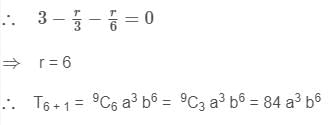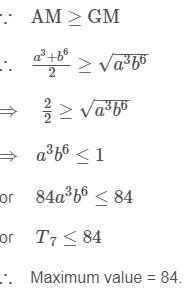JEE Exam > JEE Questions > If a3 + b6 = 2, then the maximum value of the...
Start Learning for Free
If a3 + b6 = 2, then the maximum value of the term independent of x in the expansion of (ax1/3 + bx-1/6)9 (a > 0, b > 0) is
- a)42
- b)68
- c)148
- d)84
Correct answer is option 'D'. Can you explain this answer?
| FREE This question is part of | Download PDF Attempt this Test |
Verified Answer
If a3 + b6 = 2, then the maximum value of the term independent of x in...
Let (r + 1) th term be independent of x, then

As Tr + 1 is independent of x



As Tr + 1 is independent of x


Most Upvoted Answer
If a3 + b6 = 2, then the maximum value of the term independent of x in...
To find the maximum value of the term independent of x in the expansion of (ax^(1/3) + bx^(-1/6))^9, we need to find the term with the largest exponent of x that does not have an x term.
The term independent of x in the expansion will have an exponent of x equal to 0. This occurs when the exponents of x in each term of the expansion add up to 0.
In the given expansion, the exponent of x in the first term is 1/3 and the exponent of x in the second term is -1/6. So, we need to find the values of a and b such that (1/3)a + (-1/6)b = 0.
Since a^3 = b^6 = 2, we can rewrite this equation as (1/3)(a^3) + (-1/6)(b^6) = 0.
Multiplying through by 6, we get 2a^3 - b^6 = 0.
Simplifying, we have 2a^3 = b^6.
Taking the cube root of both sides, we get (2a)^(1/3) = b^2.
Substituting this value of b^2 into the equation a^3 = 2, we have (2(2a)^(1/3))^3 = 2.
Simplifying, we get 8a = 2.
Dividing by 8, we find a = 1/4.
Substituting this value of a into (2a)^(1/3) = b^2, we have (2(1/4))^(1/3) = b^2.
Simplifying, we get (1/2)^(1/3) = b^2.
Taking the cube root of both sides, we find 1/2 = b^2.
Since b^6 = 2, we can take the square root of both sides to find b^2 = sqrt(2).
Therefore, the maximum value of the term independent of x in the expansion of (ax^(1/3) + bx^(-1/6))^9 is (1/4)^(9/3) * (sqrt(2))^0 = (1/4)^3 * 1 = 1/64.
The term independent of x in the expansion will have an exponent of x equal to 0. This occurs when the exponents of x in each term of the expansion add up to 0.
In the given expansion, the exponent of x in the first term is 1/3 and the exponent of x in the second term is -1/6. So, we need to find the values of a and b such that (1/3)a + (-1/6)b = 0.
Since a^3 = b^6 = 2, we can rewrite this equation as (1/3)(a^3) + (-1/6)(b^6) = 0.
Multiplying through by 6, we get 2a^3 - b^6 = 0.
Simplifying, we have 2a^3 = b^6.
Taking the cube root of both sides, we get (2a)^(1/3) = b^2.
Substituting this value of b^2 into the equation a^3 = 2, we have (2(2a)^(1/3))^3 = 2.
Simplifying, we get 8a = 2.
Dividing by 8, we find a = 1/4.
Substituting this value of a into (2a)^(1/3) = b^2, we have (2(1/4))^(1/3) = b^2.
Simplifying, we get (1/2)^(1/3) = b^2.
Taking the cube root of both sides, we find 1/2 = b^2.
Since b^6 = 2, we can take the square root of both sides to find b^2 = sqrt(2).
Therefore, the maximum value of the term independent of x in the expansion of (ax^(1/3) + bx^(-1/6))^9 is (1/4)^(9/3) * (sqrt(2))^0 = (1/4)^3 * 1 = 1/64.
Attention JEE Students!
To make sure you are not studying endlessly, EduRev has designed JEE study material, with Structured Courses, Videos, & Test Series. Plus get personalized analysis, doubt solving and improvement plans to achieve a great score in JEE.

|
Explore Courses for JEE exam
|

|
Similar JEE Doubts
If a3 + b6 = 2, then the maximum value of the term independent of x in the expansion of(ax1/3 + bx-1/6)9(a > 0, b > 0) isa)42b)68c)148d)84Correct answer is option 'D'. Can you explain this answer?
Question Description
If a3 + b6 = 2, then the maximum value of the term independent of x in the expansion of(ax1/3 + bx-1/6)9(a > 0, b > 0) isa)42b)68c)148d)84Correct answer is option 'D'. Can you explain this answer? for JEE 2024 is part of JEE preparation. The Question and answers have been prepared according to the JEE exam syllabus. Information about If a3 + b6 = 2, then the maximum value of the term independent of x in the expansion of(ax1/3 + bx-1/6)9(a > 0, b > 0) isa)42b)68c)148d)84Correct answer is option 'D'. Can you explain this answer? covers all topics & solutions for JEE 2024 Exam. Find important definitions, questions, meanings, examples, exercises and tests below for If a3 + b6 = 2, then the maximum value of the term independent of x in the expansion of(ax1/3 + bx-1/6)9(a > 0, b > 0) isa)42b)68c)148d)84Correct answer is option 'D'. Can you explain this answer?.
If a3 + b6 = 2, then the maximum value of the term independent of x in the expansion of(ax1/3 + bx-1/6)9(a > 0, b > 0) isa)42b)68c)148d)84Correct answer is option 'D'. Can you explain this answer? for JEE 2024 is part of JEE preparation. The Question and answers have been prepared according to the JEE exam syllabus. Information about If a3 + b6 = 2, then the maximum value of the term independent of x in the expansion of(ax1/3 + bx-1/6)9(a > 0, b > 0) isa)42b)68c)148d)84Correct answer is option 'D'. Can you explain this answer? covers all topics & solutions for JEE 2024 Exam. Find important definitions, questions, meanings, examples, exercises and tests below for If a3 + b6 = 2, then the maximum value of the term independent of x in the expansion of(ax1/3 + bx-1/6)9(a > 0, b > 0) isa)42b)68c)148d)84Correct answer is option 'D'. Can you explain this answer?.
Solutions for If a3 + b6 = 2, then the maximum value of the term independent of x in the expansion of(ax1/3 + bx-1/6)9(a > 0, b > 0) isa)42b)68c)148d)84Correct answer is option 'D'. Can you explain this answer? in English & in Hindi are available as part of our courses for JEE.
Download more important topics, notes, lectures and mock test series for JEE Exam by signing up for free.
Here you can find the meaning of If a3 + b6 = 2, then the maximum value of the term independent of x in the expansion of(ax1/3 + bx-1/6)9(a > 0, b > 0) isa)42b)68c)148d)84Correct answer is option 'D'. Can you explain this answer? defined & explained in the simplest way possible. Besides giving the explanation of
If a3 + b6 = 2, then the maximum value of the term independent of x in the expansion of(ax1/3 + bx-1/6)9(a > 0, b > 0) isa)42b)68c)148d)84Correct answer is option 'D'. Can you explain this answer?, a detailed solution for If a3 + b6 = 2, then the maximum value of the term independent of x in the expansion of(ax1/3 + bx-1/6)9(a > 0, b > 0) isa)42b)68c)148d)84Correct answer is option 'D'. Can you explain this answer? has been provided alongside types of If a3 + b6 = 2, then the maximum value of the term independent of x in the expansion of(ax1/3 + bx-1/6)9(a > 0, b > 0) isa)42b)68c)148d)84Correct answer is option 'D'. Can you explain this answer? theory, EduRev gives you an
ample number of questions to practice If a3 + b6 = 2, then the maximum value of the term independent of x in the expansion of(ax1/3 + bx-1/6)9(a > 0, b > 0) isa)42b)68c)148d)84Correct answer is option 'D'. Can you explain this answer? tests, examples and also practice JEE tests.

|
Explore Courses for JEE exam
|

|
Suggested Free Tests
Signup for Free!
Signup to see your scores go up within 7 days! Learn & Practice with 1000+ FREE Notes, Videos & Tests.
























